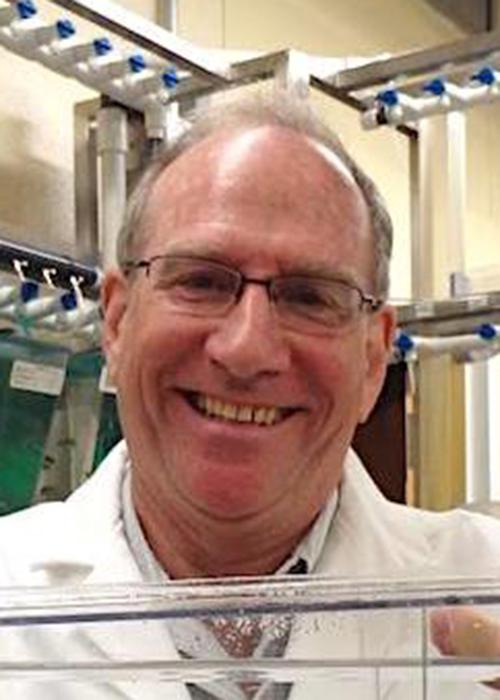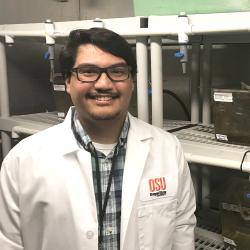
Michael L. Kent
Michael L. Kent
Research
Presently the Kent lab is focusing on two major research areas; diseases of zebrafish in research facilities and impacts of pathogens in wild fishes in Oregon. In both areas, we are focusing on the study of chronic infectious diseases. In the past 20 years there has been a dramatic increase in the use of zebrafish as a model in biomedical research. Underlying chronic diseases are of concern as they relate to non-protocol induced variation in laboratory fish, as they would with any laboratory animal. Microsporidosis (caused by Pseudoloma neurophilia); mycobacteriosis (caused by various species of Mycobacterium); the nematode Pseudocapillaria tomentosa, are all common in zebrafish facilities, and are under investigation at this time. This work is supported by NIH Office of Research Infrastructure Programs (NIH ORIP), National Institute of Allergy and Infectious Diseases (NIH NIAID), the National Cancer Institute (NIH NCI), and the National Science Foundation (NSF). Dr. Thomas Sharpton (Departments of Microbiology and Statistics) is his main collaborator for this research. He and Dr. Robyn Tanguay established the SPF (Specific Pathogen Free) zebrafish research colony at the Sinnhuber Aquatic Resource Center (OSU). This was supported by the NIEHS Environmental Health Sciences Center and NIH ORIP. Dr. Kent is also a Co-PI at the NIH Zebrafish International Resource Center at the University of Oregon where he assists with health studies and their diagnostic service.
Another main research area of the Kent laboratory is investigations on the cause of prespawn mortality (PSM) in adult Chinook Salmon in Oregon, which in some river systems often exceeds 50% in certain years. He leads studies on the role of pathogens and specific pathologic changes in this phenomenon, and most recently we have discovered a severe intestinal disease/premature senescence that is correlated with PSM. This research has been supported by U.S. Army Corps of Engineers, USDA APHIS National Animal Health Laboratory Network (NAHLN), Oregon Department of Fish and Wildlife, and the Department of Microbiology. We have a large, multidisciplinary team, with colleagues from the Department of Fisheries, Wildlife and Conversation and the U.S. Geological Survey, Oregon Cooperative Fish and Wildlife Research Unit (Drs. Jim Peterson, Carl Schreck and Claire Couch), Dr. Julie Alexander (Department of Microbiology) and Dr. Tamsen Polley (Department of Biomedical Sciences).
Research Interests
- Fish Diseases
- Parasitology
- Pathogens of Zebra Fish
Education
Ph.D., University of California
Research areas
Applied Microbiology Microbes, Microbiomes and Health Microbial Threats to Food SecurityPublications
- Selected publications in last 5 years
- Sieler, M.J., Al-Samarrie, C.,E., Kasschau, K., Varga, Z.M., Kent, M.L. Sharpton, T.J. Conventional zebrafish (Danio rerio) laboratory diets differentially alter gut microbiota composition, but not physiology. Animal Microbiome (June 2023).
- Schuster, C.J., Leong, C., Kasschau, K. Sharpton, T.J., Kent, M.L. 2023. Early detection of Pseudocapillaria tomentosa by qPCR in four lines of zebrafish, Danio rerio (Hamilton 1882). J. Fish Dis. doi: 10.1111/jfd.13773.
- Couch C.E., Neal, T.N., Herron, C.L., Kent, M.L., Schreck CB, Peterson JT. 2023. Gut microbiome composition associates with corticosteroid treatment, morbidity, and senescence in Chinook salmon (Oncorhynchus tshawytscha). Nature – Sci. Reports 13 (2567). 10.1038/s41598-023-29663-0
- Schuster, C.J., Murray, K.N., Sanders, J.L., Kent, M.L. 2023. Application of an eDNA assay for the detection of Pseudoloma neurophilia (Microsporidia) in zebrafish (Danio rerio) facilities. Aquaculture 564: 739044 https://doi.org/10.1016/j.aquaculture.2022.739044
- Schuster, C.J., Leong, C., Kasschau, K. Sharpton, T.J., Kent, M.L. 2023. Early detection of Pseudocapillaria tomentosa by qPCR in four lines of zebrafish, Danio rerio (Hamilton 1882). J. Fish Dis. (in press, Feb 2023).
- Couch C.E., Nea,l T.N., Herron, C.L., Kent, M.L., Schreck CB, Peterson JT. 2023. Gut microbiome composition associates with corticosteroid treatment, morbidity, and senescence in in Chinook salmon (Oncorhynchus tshawytscha). Naure – Sci. Reports 13 (2567). 10.1038/s41598-023-29663-0
- Schuster, C.J., Murray, K.N., Sander, J.L., Kent, M.L. 2023. Application of an eDNA assay for the detection of Pseudoloma neurophilia (Microsporidia) in zebrafish (Danio rerio) facilities. Aquaculture 564: 739044 10.1016/j.aquaculture.2022.739044
- Schuster, C.J. Kreul, T., Al-Samarrie, C.E., Peterson, J.T. Sanders, J.L, Kent, M.L. 2022. Progression of infection and detection of Pseudoloma neurophilia in zebrafish Danio rerio Hamilton by PCR and histology. J. Fish Dis. 45: 1463-1475.
- Schuster, C., Kent, M.L. Peterson, J., & Sanders, J. 2022. Multi-state occupancy model estimates probability of detection of an aquatic parasite using environmental DNA: Pseudoloma neurophilia in zebrafish aquaria. J. Parasitol. 108:527-538
- Couch ,C.E., Kent, M.L., Weiss, L.M., Takvorian, P., Nervino, S., Cummins, L. Sanders, J.L. 2022. Enterocytozoon schreckii, n.sp, infects the enterocytes of adult Chinook salmon and may be a sentinel of immunosenescence. mSphere. 10.1128/mphere.00908-21
- Murray, K.N., Clark, T.S., Kebus, M.J., Kent, M.L. 2022. Specific Pathogen Free – A review of strategies in agriculture, aquaculture, and laboratory mammals and how they inform new recommendations for laboratory zebrafish. Res. Vet Sci 142: 78-93
- Murray, K.N, Kent, M.L. 2022. Noninfectious diseases of laboratory zebrafish. In: Zebrafish: A Practical Guide to Husbandry, Welfare and Research Methodology. C. E. Allen, J-P Mocho (eds). 5m Books Limited, Great Easton, UK.
- Schuster, C.J., Sanders, J.L., Couch, C., Kent. M. L. 2022. Chapter 11. Recent advances with fish Microsporidia. In: Current Advances in the Study of Microsporidia. Edited by: L. M. Weiss, A. Reinke. Springer-Verlag. Exper. Suppl. 114. pp: 285-318
- Hurst, T.P., Copeman, L.A., Andrade, M.S. Stowell, M., Al-Samarrie, C.E., Sanders, J.L., Kent, M.L.2021. Expanding evaluation of ocean acidification responses in a marine gadid: elevated CO2 impacts development, but not size of larval Walleye Pollock. Mar. Biol. 168:119 10.1007/s00227-021-03924-w
- Neal, T., Kent, M.L., Sanders, J. Schreck, C.B., Peterson, J. T. 2021. Laboratory infection of juvenile Chinook salmon (Oncorhynchus tshawytscha) with parasitic copepod (Salmincola californiensis). J. Fish Dis. 2021. 10.1111/jfd.13450
- Kent, M.L., Wall, E.S., Sichel, S., Watral, V., Stagaman, K, Sharpton, T.J., Guillemin, K. 2021. Pseudocapillaria tomentosa, Mycoplasma spp., and intestinal lesions in experimentally infected zebrafish Danio rerio. Zebrafish 10.1089/zeb.2020.1955
- Kent, M.L., Murray, K.N., Hobbs, M.R., Weiss, L.M., Spagnoli, S.T., Sanders, J.L. 2021. Intranuclear inclusions consistent with a Nucleospora sp. in a lymphoid lesion in a laboratory zebrafish, Danio rerio (Hamilton 1822). J. Fish Dis. 44: 107-112. 10.1111/jfd.13271
- Schaaf, R.M., Sharpton, T.J., Murray, K. N., Kent, A.D., Kent, M.L. 2020. Retrospective analysis of the Zebrafish International Resource Center diagnostic data links Pseudocapillaria tomentosa to intestinal neoplasms in zebrafish Danio rerio(Hamilton 1822). J. Fish Dis. 43: 1459-1462, 10.1111/jfd.13233.
- Markle, D.F., Janik, A. Peterson, J.T., Choudhury, A., Simon, D.C., Tkach, V.V., Terwilliger, M.R., Sanders, J.L., Kent, M.L. 2020. Spatial, temporal and co-infection patterns of three parasites in young-of-the-year Shortnose Sucker, Chasmistes brevirostris, and Lost River Sucker, Deltistes luxatus, from Upper Klamath Lake, Oregon. Intl. J. Parasiol. 50: 315-330
- Sharpton, T.S., Combrink, L., Arnold, H.K., Gaulke, G.A., Kent, M.L. 2020. Harnessing the gut microbiome in the fight against anthelminthic drug resistance Curr. Opin. Microbiol.: Special Section: Host-Microbe Interactions: Bacteria Vol 53.26-34.
- Sanders, J.L., Monteiro. J.F., Martins, S., Catarina Certal, A., Kent, M.L. 2020. The impact of Pseudoloma neurophilia infection on body condition of zebrafish. Zebrafish. DOI: 10.1089/zeb.2019.1812
- Kent, M.L., Sanders, J.L., Spagnoli, S., Al-Samarrie, C.E. Murray, K.M. 2020. Review of diseases and health management in zebrafish Danio rerio (Hamilton 1822) in research facilities. J. Fish Dis 43:637-650.doi: 10.1111/jfd.13165.
- Whipps, C.M., Gauthier, D.T., Kent, M.L. 2020. Chapter 13 Fish mycobacteriosis in a changing world. In Climate Change and Infectious Fish Diseases. PTK Woo and J. Leong, (eds). CABI, United Kingdom
- Kent, M.L., Sanders, J.L. 2020. Important Parasites in Research Facilities. Chapter 40. In: The Zebrafish in Biomedical Research: Biology, Husbandry, Diseases and Research Applications. Cartner, S., Eisen, J., Farmer, S., Guillemin, K., Kent, M.L., Sanders, G.S. Am. College. Lab. Animal Med. Ser. Elsevier. Pp: 479-495.
- Kent, M.L., Murray, K.N., Fischer, K., Löhr, C., Mulrooney, D., Sanders, J.L. 2020, Special procedures for zebrafish diagnostics. Chapter 44. In: The Zebrafish in Biomedical Research: Biology, Husbandry, Diseases and Research Applications. Cartner, S., Eisen, J., Farmer, S., Guillemin, K., Kent, M.L., Sanders, G.S. Am. College. Lab. Animal Med. Ser. Elsevier. Pp. 547-558.
- Whipps, C.W., Kent, M.L. 2020. Bacterial and fungal diseases. Chapter 41. In: The Zebrafish in Biomedical Research: Biology, Husbandry, Diseases and Research Applications. Cartner, S., Eisen, J., Farmer, S., Guillemin, K., Kent, M.L., Sanders, G.S. Am. College. Lab. Animal Med. Ser. Elsevier. Pp. 495-508
- Kent, M.L., Watral, V., Gaulke, C.A., Sharpton, T.J. 2019. Further evaluation of the efficacy of emamectin for treating Pseudocapillaria tomentosa (Dujardin 1843) in zebrafish Danio rerio (Hamilton 1822). J. Fish. Dis. 42: 1351-1357.
- Gaulke, C.A., Martins, M.L., Watral, V.G., Humphreys, I.R., Spagnoli, S.T., Kent, M.L., Sharpton, T.J. 2019. A longitudinal assessment of host-microbe-parasite interactions resolves the zebrafish gut microbiome’s link to Pseudocapillaria tomentosa infection and pathology. Microbiome 7:10 10.1186/s40168-019-0622-9
- Kent, M.L., Gaulke, G.A. Watral, V., Sharpton, T.J. 2018. Pseudocapillaria tomentosa in laboratory zebrafish (Danio rerio): Patterns of infection and dose response. Dis. Aquat. Org. 131:121-131.
- Colvin, ME, Peterson, JT, Sharpe, C., Kent, M.L, Schreck, CB. 2018. Identifying optimal hauling densities for adult run Chinook Salmon trap and haul operations. River Res. Appl. DOI: 10.1002/rra.3348.
Awards
- OSU Alumni Association Distinguished Professor Award, 2018
- Agricultural Research Foundation Distinguished Faculty Award, 2018
- 2018 Outstanding Steward of Zebrafish Husbandry

